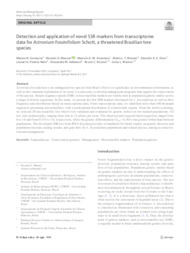Detection and application of novel SSR markers from transcriptome data for Astronium fraxinifolium Schott, a threatened Brazilian tree species.
Detection and application of novel SSR markers from transcriptome data for Astronium fraxinifolium Schott, a threatened Brazilian tree species.
Autoria: CORNACINI, M. R.; MANOEL, R. O.; ALCANTARA, M. A. M.; MORAES, M. L. T.; SILVA, E. A. A.; PEREIRA NETO, L. G.; SEBBENN, A. M.; ROSSINI, B. C.; MARINO, C. L.
Resumo: Astronium fraxinifolium is an endangered tree species from Brazil. Due to its significance in environmental reforestation, as well as the continued exploitation of its wood, it is necessary to develop management programs that support the conservation of the species. Simple sequence repeats (SSR) or microsatellite markers are widely used in population genetic studies across a range of diverse organisms. In this study, we present the first SSR markers developed for A. fraxinifolium as well as their frequency and distribution based on transcriptome data. From transcriptome data, we identified more than 100 thousand sequences presenting microsatellites, with a predominant distribution of trinucleotide repeats. From the initial screening, we selected 20 microsatellite loci which were validated and evaluated for genetic indices in two natural populations. All loci were polymorphic, ranging from four to 11 alleles per locus. The observed and expected heterozygosities ranged from 0 to 1.0 and from 0.533 to 1.0, respectively, while the genetic differentiation (GST = 0.363) was greater within than between populations. The developed SSR loci from RNA-Seq data provides a foundation for future studies on genetic diversity and population structure, mating system, and gene flow for A. fraxinifolium populations and related species, aiming at conservation and management.
Ano de publicação: 2021
Tipo de publicação: Artigo de periódico
Unidade: Embrapa Pesca e Aquicultura
Observações
1 - Por padrão são exibidas publicações dos últimos 20 anos. Para encontrar publicações mais antigas, configure o filtro ano de publicação, colocando o ano a partir do qual você deseja encontrar publicações. O filtro está na coluna da esquerda na busca acima.
2 - Para ler algumas publicações da Embrapa (apenas as que estão em formato ePub), é necessário ter, no celular ou computador, um desses softwares gratuitos. Sistemas Android: Google Play Livros; IOS: iBooks; Windows e Linux: software Calibre.
Acesse outras publicações
Acesse a Base de Dados da Pesquisa Agropecuária (BDPA) para consultar o acervo completo das bibliotecas da Embrapa.

